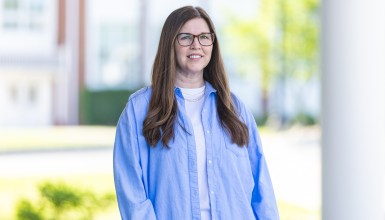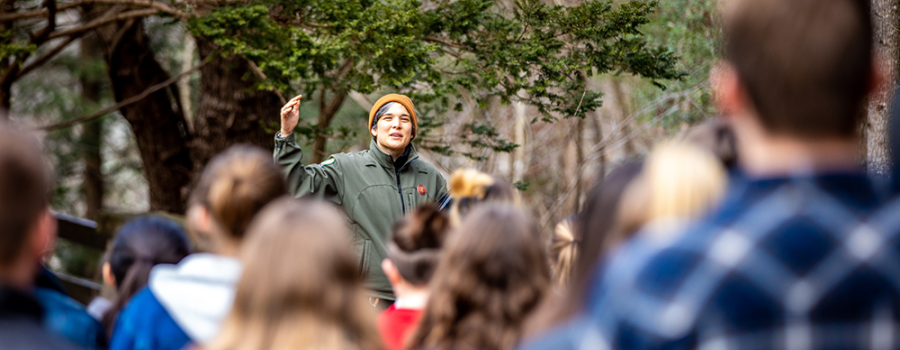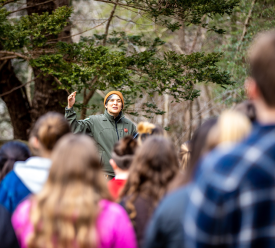Bring biology to life for your future students.
There’s something about the scientific study of life that makes you feel more alive, and you can’t shake the thought that you should teach others about it too. Good news: A bachelor’s degree in biology education from University of the Cumberlands provides all the training that new educators need to become effective biology teachers. In our Correll Science Complex – featuring laboratories and classrooms equipped with the latest media, audio, and data transmission technology – you’ll learn from skilled faculty what it means to be a great biology teacher. Additionally, biology students have the option to pursue specialized research through independent coursework, field study, Presidential Scholar research, and study abroad programs. You can even assist faculty members as they teach in campus laboratories or conduct research, giving you valuable experience.
By the numbers
Programs & Requirements
* The credit hours listed on this page only reference the specific program requirements and is not reflective of the total hours necessary to receive your degree. Cumberlands requires all students obtain a minimum of 60 hours for an associate’s degree and a total of 120 hours for a bachelor’s degree. Transfer and prior learning credits may be counted toward those totals.
To learn more about our General Education Requirements, please visit the page referenced below or explore our Academic Catalog.
Bachelor of Science in Biology Education (Secondary Certification)
A biology education major provides the training you need to pursue a career teaching science in public and private schools. This is your opportunity to build a solid fundamental understanding of all sciences, with a special emphasis in biological sciences — from cellular biology to genetics to biodiversity. In addition, you will gain a comprehensive education in age-appropriate lesson planning, classroom management, creating assessments, and other necessary skills that middle school and high school science teachers need to succeed.
Notes:
** Additional 42 Hours of professional education courses required for secondary certification
Students in the B.S. in Biology for Secondary Education have the same 55 Biology credit requirement as Biology majors with the following exception, BIOL 410 - Teaching Practicum in Biology and BIOL 231 - Introduction to Environmental Science or BIOL 448 - General Ecology are required. Students seeking secondary certification must also take the required professional education courses as described in the Department of Education portion of this catalog. Students completing this degree will be required to report scores from the ETS subject area exam in biology prior to graduation.
Course Requirements
In addition to the courses listed, as a biology education major, you will also need to take education courses and complete observation hours in local classrooms. View our course catalog for more details.
- BIOL 113 - Introduction to Population Biology Laboratory
- BIOL 114 - Introduction to Cellular Biology Laboratory
- BIOL 133 - Introduction to Population Biology
- BIOL 134 - Introduction to Cellular Biology
- BIOL 210 - Introduction of Biological Literature
- BIOL 246 - Biodiversity
- BIOL 340 - Genetics
- BIOL 495 - Senior Seminar OR BIOL 498 - Senior Thesis
Choose 1 Biology Emphasis area and Choose 18 credits in that Emphasis area. See Biology Emphasis Requirements.
Students taking more than one biology integrated studies course will only get upper division biology credit for the first one.
A Bachelor of Arts requires all the same courses as a Bachelor of Science with the addition of four classes (12 hours) in a foreign language.
Choose one foreign language sequence:
- FREN 131 Elementary French I
- FREN 132 Elementary French II
- FREN 231 Intermediate French I
- FREN 232 Intermediate French II
- SPAN 131 Elementary Spanish I
- SPAN 132 Elementary Spanish II
- SPAN 231 Intermediate Spanish I
- SPAN 232 Intermediate Spanish II
Take the Next Step
Mission & Goals
The mission of the biology education degree program at Cumberlands is to train competent and caring educators through innovative exploration, rigorous academics, advantageous opportunities, and hands-on experience in the laboratory and classroom.
Biology Education Careers & Outcomes
All stats from U.S. Bureau of Statistics
Biology Teacher (9-12): $61,820
Biology Teacher (9-12): $61,820
High school teachers teach academic lessons and various skills that students will need to attend college and to enter the job market.
Medical Scientist: $95,310
Medical Scientist: $95,310
Medical scientists conduct research aimed at improving overall human health.
Lab Technician/Assistant: $57,800
Lab Technician/Assistant: $57,800
Clinical laboratory technologists and technicians perform medical laboratory tests for the diagnosis, treatment, and prevention of disease.
Physician Assistant (PA): $121,530
Physician Assistant (PA): $121,530
Physician assistants examine, diagnose, and treat patients under the supervision of a physician.
Natural Sciences Manager: $137,900
Natural Sciences Manager: $137,900
Natural sciences managers supervise the work of scientists, including chemists, physicists, and biologists.
School Administrator: $106,850
School Administrator: $106,850
Education administrators plan, direct, or coordinate the academic, administrative, or auxiliary activities of kindergarten, elementary, or secondary schools.
Common Questions
First, you need to check with the certifying board in the state in which you hope to teach, as each one may have slightly different qualification requirements.
Next, you need to earn a relevant bachelor’s degree. To be a science teacher, your degree should explore scientific principles of the biological sciences. And it must offer coursework designed to help you understand how to teach young people.
From there, you will likely need to pass a state test, apply for teaching certification, and then start applying for open biology teacher positions.
Your biology degree with secondary education certification will qualify you for a career in education. But if you would like to pursue other opportunities, you might consider becoming a natural sciences manager, a biological scientist, or a lab assistant or technician.
If you want an extra challenge by pursing a degree in a graduate program, you can prepare for jobs in biology in a number of fields, including medicine, environmental studies, or biotechnology. Physicians, physical therapists, dentists, and veterinarians, for example, all require additional graduate degrees in order to obtain certification.
Yes! In addition to the overall university accreditation through the Southern Association of Colleges and Schools Commission on Colleges (SACSCOC), our education program also has state accreditation through the KDE/EPSB (Kentucky Department of Education/Educational Professional Standards Board) as well as national accreditation through the CAEP (Council for Accreditation of Educator Preparation).
Though having a vehicle on campus opens several more options for local schools in which to gain observation hours, we’re happy to say that we have a good working relationship with Williamsburg Independent School District (WISD), whose school building is a five-minute walk from campus.
Students who are pursuing majors in STEM fields (Science, Technology, Engineering, Math) have the option of pursuing work-study positions as teaching assistants for professors in the Departments of Biology, Chemistry, and Physics. Not only do the work hours give you excellent experience in the lab, they also give you experience doing other tasks related to research or teaching as professors assign them – all while earning money to put toward your education.
Absolutely! We offer man different scholarships, from merit (academic), athletic, and music scholarships to endowed scholarships. If you're from Whitley County or a nearby county in Kentucky, you may even qualify for the Mavis Broome Scholarship for education majors. Visit our financial aid page for more information.
Faculty Experts in Biology
Learn more about your future biology and education professors!

Ashton Leach

Melissa Evans

Elisha Sester
Request Information
Want to learn more about our biology education program? This is the place to ask.

